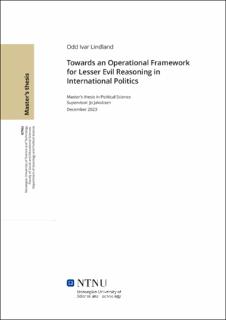Towards an Operational Framework for Lesser Evil Reasoning in International Politics
Master thesis
Permanent lenke
https://hdl.handle.net/11250/3120187Utgivelsesdato
2024Metadata
Vis full innførselSamlinger
Sammendrag
Denne oppgaven belyser moralperspektivet i beslutningsprosesser i internasjonal politikk. Oppgaven er inspirert av den klassiske realismens forståelse av verden, Hans Morgenthaus tolkning av politisk moral og hvorfor han mener prinsippet om ‘the lesser evil’ bør være det bærende moralske kompasset i internasjonal politikk. Til tross for at dette prinsippet har lange tradisjoner, innebærer bruken av det avdekket en rekke fallgruver. Et omforent rammeverk for å systematisk identifisere et «lesser evil»-beslutningsalternativ finnes heller ikke. Jeg foreslår i denne oppgaven et rammeverk til å understøtte dette moralske prinsippet om ‘lesser evil’ i internasjonal politikk. Rammeverket bruker kompleksitet som et mål på ‘evilness’ og derfor kalt det Problem Complexity Framework. Det er basert på en teoretisk tolkning av nøkkelområder i klassisk realisme, samt konseptet ‘wicked problems’. Jeg utleder syv (7) såkalte kompleksitets-faktorer. Disse faktorene skal bidra til å evaluere graden av kompleksitet av et problem. Innenfor internasjonal politikk er internasjonale konflikter en sentral problemtype. Utenrikspolitiske tilnærminger som diplomati, avskrekking, sanksjoner og militærmakt er forskjellige måter å håndtere/løse en konkret konflikt. I mitt rammeverk kan ulike beslutningsalternativer antas å påvirke kompleksiteten til konflikten. Ved å sammenligne hvordan hvert alternativ endrer konfliktens kompleksitet, blir det alternativet som best håndterer eller reduserer kompleksiteten ansett som det ‘lesser evil’ beslutningsalternativet og dermed det beste moralske valget. I oppgaven eksemplifiserer jeg rammeverket gjennom en analyse av kompleksiteten i konfliktsituasjonen før den amerikanske invasjonen av Irak i 2003. Jeg analyser hvordan beslutningsalternativene avskrekking og invasjon ville påvirke kompleksiteten til situasjon. Jeg argumenterer for at avskrekkingsalternativet muligens ville redusere kompleksiteten til konflikten, i motsetning til invasjons-alternativet. Av disse to alternativene fremstår avskrekking derfor som et riktigere moralsk valg (the lesser evil) fremfor bruk av militærmakt. Tittelen på oppgaven antyder at rammeverket fortsatt er umodent og i liten grad empirisk validert gjennom denne analysen. Men oppgaven gir et grunnlag for videre forskning og forhåpentligvis kan dette rammeverket være et mulig nyttig verktøy til å analyse det moralske perspektivet i politisk beslutningstaking, som supplement til andre tilnærminger og modeller. This thesis explores decision-making and morality within international politics. The point of departure is the worldview of classical realism and Hans Morgenthau’s interpretation of evilness in politics justifying that lesser evil principle as bearing moral compass in international politics. Despite the historical tradition of the lesser evil principle, neither Morgenthau nor other thinkers have established an operational framework to guide decision-makers in its application. Instead, lesser evil reasoning is fraught with shortcomings and pitfalls. Thus, I hereby propose a framework that aims to cater to these shortcomings and help decision-making. Drawing on a theoretical interpretation of key aspects of classical realism and the concept of wicked problems, the thesis proposes a framework, termed the Problem Complexity Framework, that seeks to comprehend the 'evilness' (or complexity) inherent in a problem or situation and provide a robust justification for selecting the lesser evil alternative to address it. Seven factors, termed complexity factors, are suggested to contribute to the problem's complexity and how various alternatives might impact these factors, subsequently influencing the overall degree of complexity. By comparing how each alternative alters the complexity of the problem or situation, the alternative that diminishes the 'evilness' the most becomes the lesser evil alternative and the preferable choice. Thus, the framework's moral dimension aligns with the ethical underpinning of the lesser evil principle.The framework's application and usage are demonstrated by assessing the complexity of the situation before the US invasion of Iraq in 2003 and how key decision alternatives, Deterrence and Invasion, would impact this complexity. Arguing that the Deterrence alternative would possibly reduce the complexity, in contrast to the Invasion alternative, the Deterrence alternative is deemed to be a lesser evil option. I further discuss how the framework improves the justification for reaching the lesser evil alternative from a comparable assessment made in my bachelor thesis. I have titled the thesis “Towards an Operational Framework to Lesser Evil Reasoning in International Politics”. Clearly, the framework is far from mature and is empirically not validated through this thesis. Hence, I discuss not only perceived contributions but also some key issues and challenges that motivate new avenues for further research. Still, the framework represents a modest step towards such a goal, and could, if developed, hopefully represent a useful tool in political decision-making, supplementing other approaches and models
